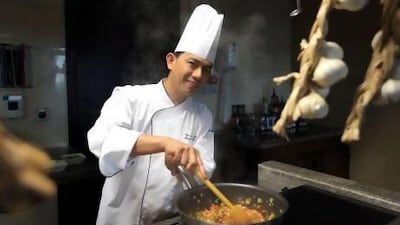Idin Asmitha is the executive sous chef at Anantara Eastern Mangroves Hotel and Spa in Abu Dhabi. The 41-year-old from Indonesia, who first moved to the UAE in 2000 and joined the hotel last year, has been cooking up a spread for iftar and suhoor during the holy month while also fasting himself. Here he talks about a day in his life during Ramadan.
3am
This is my normal wake-up time during Ramadan as I have to have suhoor. My wife cooks authentic Indonesian food such as beef rendang with steamed rice. I need to have a heavy meal like this one to stay energised throughout the day. This year fasting during Ramadan is one of the longest, from 4.15am until 7.15pm. I don't miss Indonesian food because my wife likes to cook at home and she prepares Indonesian food. At the hotel, I have put some Indonesian dishes in the iftar buffet besides Arabic and continental food. I have also trained a guy here to prepare nasi goreng, which is fried rice with spices, among other dishes.
4.15am
The fasting starts around this time and each day the timing is different. I get the notification each day from a newspaper or a local magazine. I wait for the fajr prayer at 4.30am and read the Quran. After that I catch up with paperwork from the hotel. I do that until 9am when I get ready to go to the hotel. I spend most of my time at the job because I love it.
9.30am
The first thing I have is a morning briefing with the management for half an hour, then I check reservations for the iftar. These come in the previous night. A few days ago, we had 100 guests at the Ingredients restaurant and 300 more at the ballroom for the iftar. For ballroom iftars, we get a 48-hour notification. I have to cook for surplus but I also have to check the quantity of the food cooked so that food is not wasted. We have three shifts and 45 chefs in total - four chefs for the suhoor shift, which is scheduled, and 20 chefs for the two restaurants at the hotel and the banquet hall for the iftar shift.
2pm
I spend most of the afternoon in the kitchen, monitoring the quality of the food being prepared. We have three rotation menus. For iftar, we have a mix of Arabic, Asian and continental food. In Arabic, we have the cold mezze, 21 kinds of salads and five types of bread among others. We also have five types of international bread, such as sour dough and baguettes. For sweets, we have 25 Arabic desserts and 60 in total at the sweets stand.
7.15pm
I break my fast with laban and three dates and continue serving my guests until 9pm. But I send my Muslim chefs to break their fast for 15 minutes.
9pm
I eat some Arabic food such as a rice dish called maqluba and another rice dish, kabsa, at the hotel but I don't eat too much because I have to eat during suhoor. These foods are heavy, however, because I need some energy after fasting.
11.30pm
I go home after the buffet is over. I live in staff accommodation, which is five minutes from the hotel. I live with my wife and a daughter and a son. I either prepare some Indonesian food or eat what my wife has made, and go to sleep at 1.30am. It is difficult getting so little sleep but for me it is normal during this time and I believe in God. When it is not Ramadan, I get five hours' sleep. In Indonesia, we go to prayers during the holy month with family and friends. Everything is the same here during Ramadan, only I miss my brothers and sisters back home.

